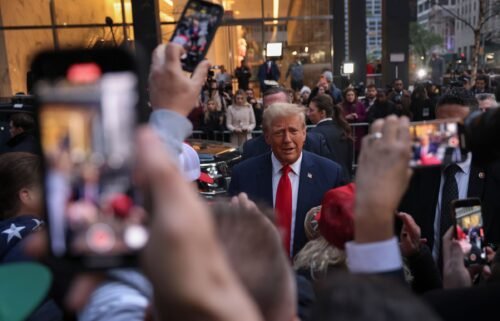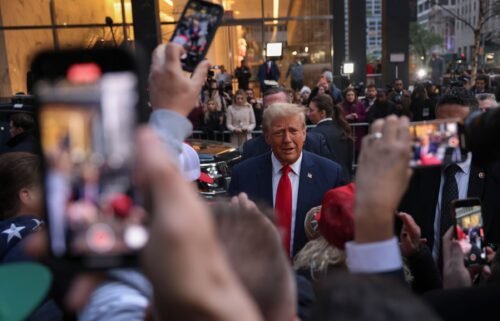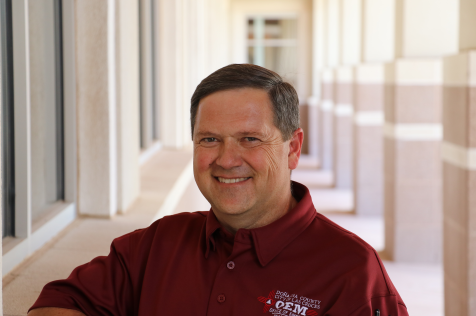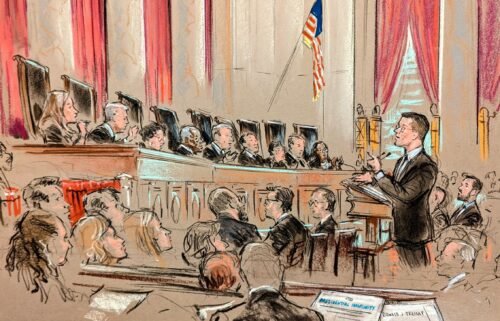Who knew what during the Ukraine pressure campaign, according to Gordon Sondland
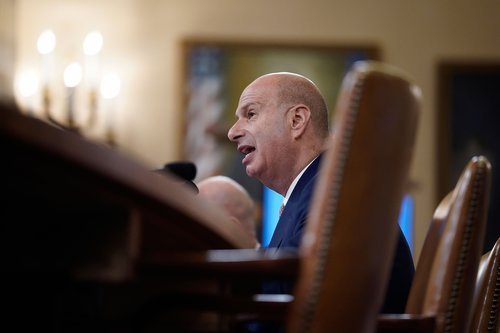
US Ambassador to the European Union Gordon Sondland, in his opening statement, made clear that some of President Donald Trump’s senior-most aides were aware of a link between US aid to Ukraine and the country opening investigations that would benefit Trump politically.
“Everyone was in the loop,” he said. “It was no secret.”
Here is what he says these officials knew, and what they’ve said before Wednesday’s testimony about their involvement:
President Donald Trump
What Sondland says: The ambassador’s own efforts to pressure Ukraine into opening the investigations came at the “express direction of the President of the United States.”
“We followed the President’s orders,” Sondland said.
What Trump has said: Trump has been adamant in his self-defense, insisting over and over there was “no quid pro quo” in Ukraine.
What Trump says now: Departing the White House on Wednesday, Trump continued to insist he’d told Sondland there was no “quid pro quo” with Ukraine.
Quoting Sondland in his testimony, Trump said he told Sondland, “I want nothing. That’s what I want from Ukraine. That’s what I said. I want nothing. I said it twice.”
Mike Pence, vice president
What Sondland says: He told Pence in early September that he was concerned US aid to Ukraine was being tied to investigations into Trump’s political rivals.
What Pence has said: Under repeated questioning, Pence has refused to say whether he knew there was a link between US aid and investigations. He’s denied ever linking the issues in his own conversations with Zelensky, and told CBS last month: “I can only tell you what I know, and what I know is that the transcript of the President’s call with Ukrainian President Volodymyr Zelensky shows that there was no quid pro quo.”
What Pence’s office says now: In a statement released as Sondland was testifying, Pence’s chief of staff Marc Short said the vice president “never had a conversation with Gordon Sondland about investigating the Bidens, Burisma, or the conditional release of financial aid to Ukraine based upon potential investigations.”
“This alleged discussion recalled by Ambassador Sondland never happened,” Short said.
Mike Pompeo, secretary of state
What Sondland says: Pompeo was kept apprised on his efforts in Ukraine, and cites emails to the top diplomat showing he raised the issue of linking aid to Ukraine with investigations. Sondland also says “based on my communications with Secretary Pompeo,” he felt comfortable raising concerns about the linkage to a top aide to Zelensky.
What Pompeo has said: Asked on ABC in October about claims the White House conditioned US aid on investigations, Pompeo said: “I never saw that in the decision-making process that I was a part of.”
“The conversation was always around, what were the strategic implications? Would that money get to the right place?” he said.
What Pompeo’s office says now: On Wednesday, the State Department spokesperson Morgan Ortagus released a statement denying some of Sondland’s claims.
“Gordon Sondland never told Secretary Pompeo that he believed the President was linking aid to investigations of political opponents,” she said as Pompeo was traveling in Brussels. “Any suggestions to the contrary is flat out false.”
Mick Mulvaney, acting White House chief of staff
What Sondland says: An email to Mulvaney on July 19 to set up a phone call between Trump and Zelensky made the alleged exchange clear. Mulvaney responded that he was asking the National Security Council to arrange the call for the next day.
What Mulvaney has said: In a now-infamous news conference, Mulvaney confirmed there was a quid pro quo but downplayed its significance. He later denied he said that. He’s refused to be interviewed by congressional investigators.
Rick Perry, energy secretary
What Sondland says: Perry was directly involved in carrying out the wishes of the President by working with Trump’s personal attorney Rudy Giuliani secure the investigations.
What Perry has said: Perry has denied any quid pro quo, including in an October 18 interview with Fox: “There was no quid pro quo in the sense of what those folks out there would like for it to be … I never heard that said anywhere, anytime in any conversation.”
He’s also refused to cooperate with the investigation.
What Perry’s office says now: Energy Department press secretary Shaylyn Hynes issued a statement Wednesday in response to Sondland’s testimony, saying the ambassador “misrepresented both Secretary Perry’s interaction with Rudy Giuliani and direction the Secretary received from President Trump.”
John Bolton, then-national security adviser
What Sondland says: Like other witnesses, Sondland recalls a meeting in Bolton’s office on July 10 where he linked the investigations and a White House meeting for Ukraine’s Zelensky. Sondland also says Bolton’s office requested Giuliani’s contact info before a visit to Kiev.
What Bolton has said: Bolton has remained silent as the impeachment proceeding advances. He has refused congressional requests for an interview, and wants a judge to decide whether he should cooperate with investigators or follow the White House guidance not to comply.

